#waseda university
Photo
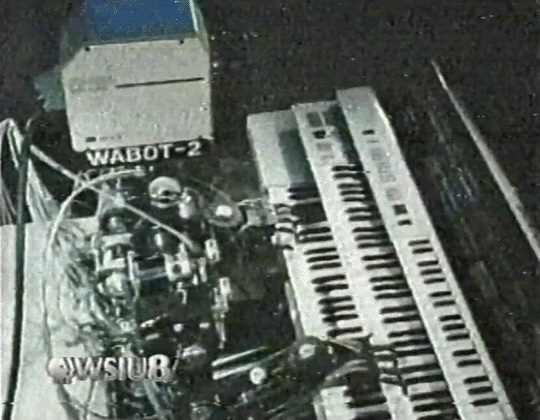
803 notes
·
View notes
Text
Pro-Palestine student demonstrations spread to Japan on Friday, with a protest held at Waseda University in Tokyo against Israel’s ongoing offensive in the Gaza Strip, Anadolu Agency reports.
Footage on social media shows dozens of students gathering in support of Palestinians, chanting “Free Palestine, free Palestine, and Palestine will be free.”
They were also carrying banners and placards with slogans against Israel and “Free Palestine, Save Gaza.”
Continue Reading.
15 notes
·
View notes
Text
Let’s go back to university and go on an exchange study trip at Waseda University where they have a Doraemon Study Club 早稲田大学ドラえもん研究会.
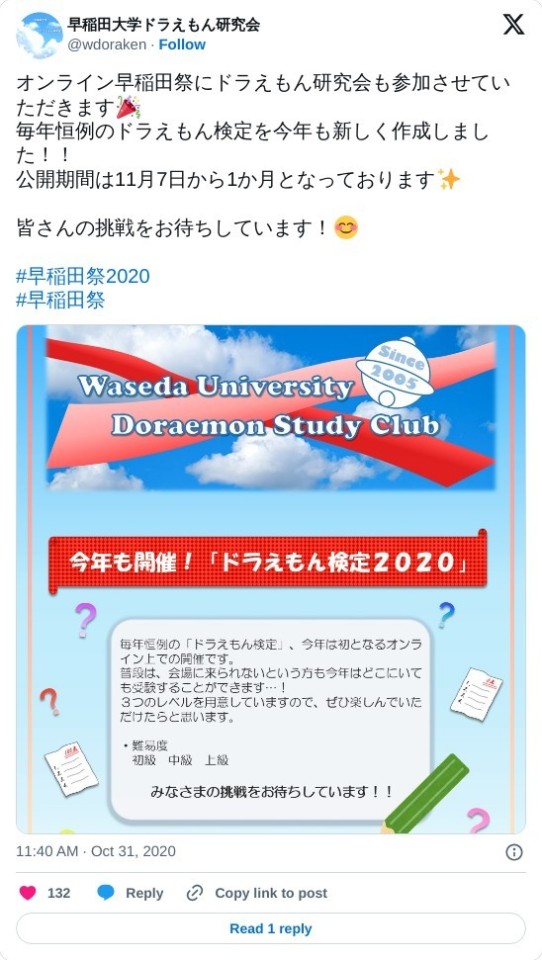
I kid you not, find them at:
- Official site, http://wdoraken.55street.net/toppage.htm
- Twitter/X, https://twitter.com/wdoraken
- Instagram, https://www.instagram.com/wdoraken/
- YouTube, https://www.youtube.com/channel/UCpA3NcyMWpqolSt_CorZyww
They even have tests, including an English version. How mind blowing is that?
Find the tests here: https://drive.google.com/drive/folders/1NYgubjiuqwLYYnPWPcNhZOePGC3QuL2X
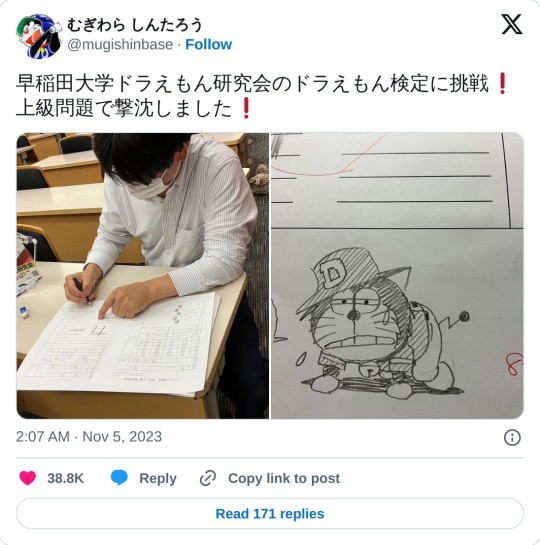
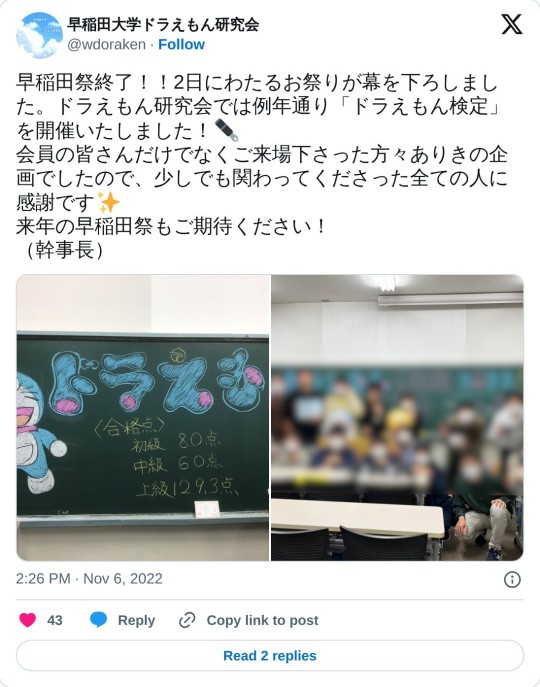
8 notes
·
View notes
Text
Metals are typically used as active materials for negative electrodes in batteries. Recently, redox-active organic molecules, such as quinone- and amine-based molecules, have been used as negative electrodes in rechargeable metal-air batteries with oxygen-reducing positive electrodes. Here, protons and hydroxide ions participate in the redox reactions. Such batteries exhibit high performance, close to the maximum capacity that is theoretically possible. Furthermore, using redox-active organic molecules in rechargeable air batteries overcomes problems associated with metals, including the formation of structures called 'dendrites,' which impact battery performance, and have negative environmental impact. However, these batteries use liquid electrolytes -- just like metal-based batteries -- which pose major safety concerns like high electrical resistance, leaching effects, and flammability.
Now, in a new study published in Angewandte Chemie International Edition on May 2, 2023, a group of Japanese researchers have developed an all-solid-state rechargeable air battery (SSAB) and investigated its capacity and durability. The study was led by Professor Kenji Miyatake from Waseda University and the University of Yamanashi, and co-authored by Professor Kenichi Oyaizu from Waseda University.
Read more.
24 notes
·
View notes
Text
"If the issue of 'plastic air pollution' is not addressed proactively, climate change and ecological risks may become a reality, causing irreversible and serious environmental damage in the future," the study's lead author warned.
6 notes
·
View notes
Text

Hexaarylbenzenes (HABs) with six different substituents were synthesized for the first time in 2015 by a research team consisting of Kenichiro Itami and Shin Suzuki from Nagoya University and Junichiro Yamaguchi from Waseda University in Japan, which is a milestone.
"The key to access HABs was to use thiophene (a five membered ring containing a sulfur atom) as the starting material," says Junichiro Yamaguchi who co-led the research. "
They describe a programmed synthesis of hexaarylbenzenes using C-H activation, cross-coupling and [4+2] cycloaddition reactions. The present method allows for the isolation and structure–property characterization of hexaarylbenzenes with distinctive aryl substituents at all positions for the first time. Moreover, the established protocol can be applied to the synthesis of tetraarylnaphthalenes and pentaarylpyridines(Nat. Chem. 2015, 7, 227). Two years later, the team again synthesized octaarylnaphthalenes (OAN) and octaarylanthracenes (OAA) with eight different substituents.

More information: "Synthesis and characterization of hexaarylbenzenes with five or six different substituents enabled by programmed synthesis" by Shin Suzuki et al, Nature Chemistry. DOI: 10.1038/nchem.2174
Journal information: Nature Chemistry
#chemistry#science#kingdraw#did u know#molecule#nagoya#waseda university#stemblr#chemblr#uni studyblr
9 notes
·
View notes
Text
I Graduated from University!@Nonaka Miki (23.10.03)
Chel here😈💜👾
Thank you very much
For coming to look at my blog!
Your likes and comments
Make me super happy!
☁️🎀Yesterday's 2 choices🎀☁️
Do you carry a lot of luggage?Or not really?
It was about 50-50!
I take a lot of luggage when staying somewhere overnight
But generally I don't carry a lot!
I was to carry less overall 🌠
☁️🎀❛ ・ ❛🎀☁️
I have graduated
From Waseda University Humanities Department e School。
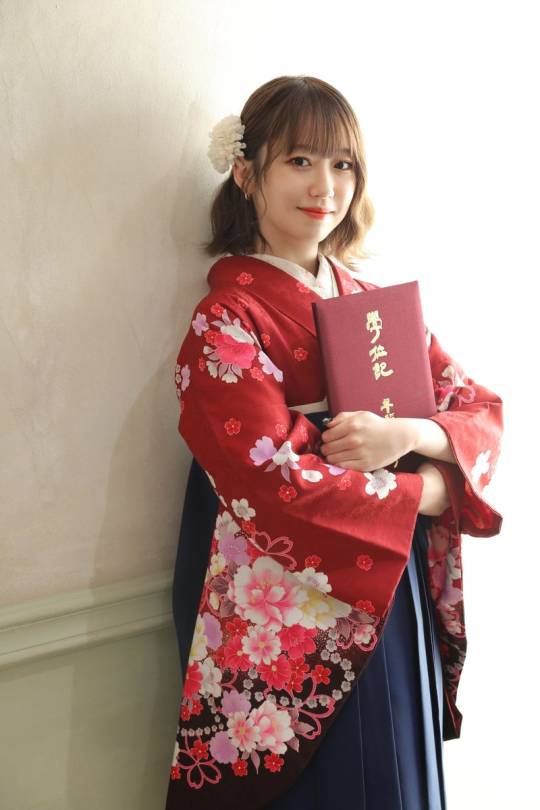

On the days where I had both work and school
I was really happy、and I felt that I made the most of my time。
During the time when I was shooting my photobook which is releasing this week、
I wrote the majority of my graduation thesis
So it was a very memorable time for me!
I'm truly grateful to you all
For always warmly supporting me。
I want to apply everything I've learned、
And continue to learn from here on too!
(T/N News and information has not been translated)
☁️🎀Today's 2 choices🎀☁️
I don't have 2 choices for today!
I will just read
Your regular comments ❤️
For reading until the very end
Thank you very much ❤️
Please come by again tomorrow!
See ya 🐾
#miki nonaka#nonaka miki#morning musume#hello! project#chel#nonaka miki translations#cheltranslations#blog translations#hello project#12ki#morning musume 23#Mm23#12ki member#hello project translations#morning musume translations#hello project blog translations#morning musume blog translations#hello! pro#hello pro#waseda university#Waseda#kimono#japanese idol#japanese language#learn japanese#japanese#japan#idol#Idol blog#Idol blog translation
3 notes
·
View notes
Text
Allaro Motor Works
Capital 112,121,181,513,152,015,182,315,181,119
Capre
112,121,181,513,152,015,182,315,181,119
Volume 121,181,513,152,015,182,315,181,119
Price $ 1B share 1M Auction in reverse Appraising resources and production partners Porsche - 1 Billion dollar share exchange, stock fall 1,000 per share . Decline at 50 to 100 and stability and incline by nature and market effects
Porch or Porsche, Green or Red
#alltrust legal corporation.#waseda university#Porsche BMW Rolls Royce Lexus Mercedes Bugatti Lamborghini Mitsubishi all others Merging again secured Investiment partnerly Stock friendly
7 notes
·
View notes
Text
Update on Study abroad
I just sent off my application form to study in Japan next year! I applied to Keio university as my first choice, Waseda as my second and Toyo as my third. I’m so nervous I hope I get one of my choices!! (>人<;)
Thank you so much to everyone who sent me advice on Japanese universities and their year abroad experiences. 皆さんありがとうございました。Any more advice would be greatly appreciated too. 、(╹◡╹)♡
Now I just have to wait until the end of January to see what school my university has assigned me to, then I’ll begin the year long process of sending documents, sorting accommodation and my classes, as well as mentally preparing myself!
#japanese#studyblr#日本語#japan#langblr#study abroad#study in japan#keio university#waseda university#language learning#japanese grammar#study japanese#nihongo#study
19 notes
·
View notes
Text
youtube
0 notes
Text
youtube
ただし、BGM(ニガミ17才)
by Waseda Univ. Music and Movie Gatherin'(MMG)
0 notes
Text
Workshop seeks to promote Hue city's cultural landscapes
via Vietnam Plus, 09 August 2023: The Hue Monuments Conservation Centre and Japan’s Waseda University hosted a workshop on preserving and developing the cultural landscapes of Hue heritage, focusing on aspects like feng shui elements, heritage management,
via Vietnam Plus, 09 August 2023: The Hue Monuments Conservation Centre and Japan’s Waseda University hosted a workshop on preserving and developing the cultural landscapes of Hue heritage, focusing on aspects like feng shui elements, heritage management, and community-based eco-tourism, to contribute to a master plan for conservation until 2050.
At the workshop, experts and researchers exchanged…
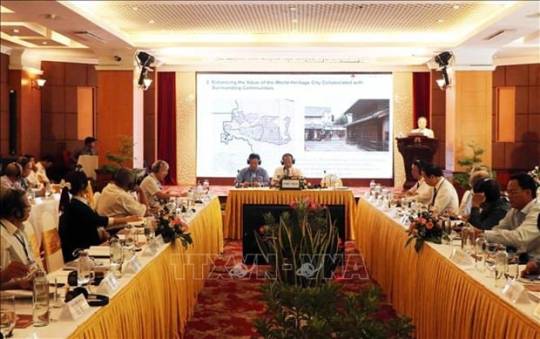
View On WordPress
0 notes
Photo

#takadanobaba#japan#tokyo#okuma teien#waseda university#shinjuku#okuma garden#leaves changing color#autumn color#autumn color of leaves#autumn leaves#autumn colours#autumn colors#waseda
0 notes
Text
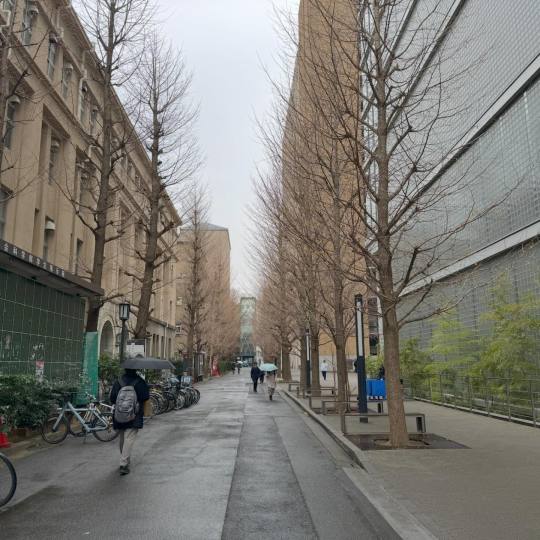
0 notes
Text
I’m annoyed that I need to get to NCV on Thursday afternoon cause I have an exam in the morning
#university removes two breaks and it fucks with my planning#so I will miss the hs meetup probably and need to get ready for the cosplay competition before 17#WHICH I’m still not completely done with the costume. like I’m gonna have to skip some parts and just make sure the rest is wearable#but STILL#annoyance#and I need to keep up with my application for my studies at waseda and eurgh I’m stressed#Eli writes
1 note
·
View note
Text
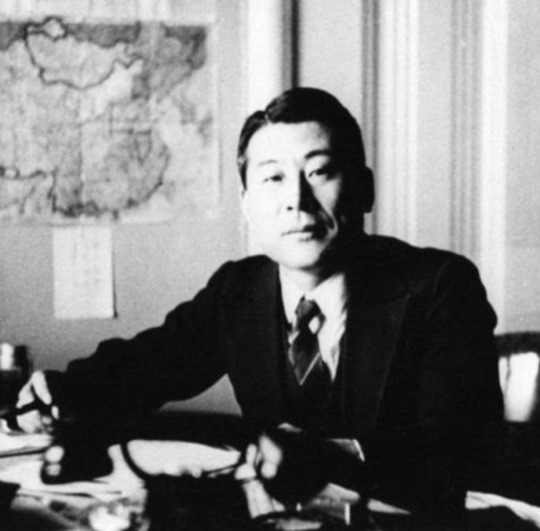
Chiune Sugihara was a Japanese diplomat in Lithuania who put his family and career at risk by issuing thousands of hand-written transit visas to Jewish refugees fleeing Eastern Europe.
Chiune was born to a middle class family in Mino, Japan on the first day of the 20th century – 1/1/00. In elementary and high school he was a top student, and his father wanted him to become a doctor. Chiune’s own dream was to enter the foreign service, and he deliberately failed the medical school entrance exam by writing only his name on the test. Instead Chiune attended Waseda University and majored in English. He also joined a Christian fraternity to practice his English.
In 1919, Chiune passed the Foreign Ministry Scholarship exam, and served in the Japanese Imperial Army as a 2nd Lieutenant stationed in Korea. He resigned his commission in 1922 and trained for the Foreign Ministry, learning Russian and German in addition to English. He aced the qualifying exam and was sent to work in the foreign office in Harbin, China.
Chiune’s strong moral compass led him to resign his post as Deputy Foreign Minister in Manchuria because of rising Japanese violence against the Chinese (just two years later was the horrific Rape of Nanking by the Japanese Imperial Army.) Chiune returned to Japan, where he married Yukiko Kikuchi. They later had four sons.
Next Chiune went to Helsinki, Finland, where he worked as a translator for the Japanese delegation. In 1939, Chiune became vice-consul of the Japanese embassy in Kauna, Lithuania. Part of his job was to find out if Germany planned to attack the Soviet Union, and to relay any information about this to his bosses in Berlin and Tokyo.
In 1940, the Soviet Union occupied Lithuania. At that time, approximately 1/3 of Lithuanians were Jewish, many of them Torah scholars. The USSR viciously persecuted Jews, especially religious ones, and the Jews of Lithuania were desperate to escape the country – especially because Nazi Germany was occupying more and more of Eastern Europe and would soon be in Lithuania. Hundreds of them, mostly Orthodox, visited the Japanese consulate to beg for exit visas to Japan. The official Japanese policy was that candidates for visas must go through elaborate bureaucratic procedures and pay significant sums of money. Chiune contacted his superiors at the Japanese Foreign minister to ask if the rules could be relaxed to help Jewish refugees. His request was denied, as were his next two requests.
Chiune could have thrown up his hands and told the Jews there was nothing he could do for them, but instead, as he did in China, he was governed by his strong sense of right and wrong, rather than soulless bureaucrats. He ignored his orders and started issuing ten-day visas for Jews to travel through Japan on their way to safe havens like Shanghai, China, where 20,000 Jews rode out the war safely.
As word got out about the Japanese visas, Jews from all over Lithuania as well as Poland began to swarm Chiune’s office. He simply wouldn’t say no to anybody, and spent 18-20 hours a day (!) painstakingly writing visas by hand. He created a month’s supply of visas every single day from August to early September 1940, providing an escape route for thousands of Jews. On September 4, the Japanese consulate in Kauna was closed and Chiune had to leave the country. He was determined to create as many transit visas as possible, and continued doing so up until the last minute. At Kanuas Railway Station, a crowd of Jews gathered to say goodbye. Right before boarding the train, Chiune bowed deeply and cried out, “Please forgive me! I cannot write anymore. I wish you the best!” Someone in the crowd shouted, “Sugihara! We’ll never forget you! I’ll surely see you again!”
Chiune was reassigned to East Prussia, then Prague, and then Bucharest, Romania. When the Soviet Union occupied Lithuania in 1944, Chiune and his family were imprisoned in a POW camp for a year and a half. Finally they were released in 1946 and returned to Japan, but the foreign office had heard about his unauthorized visas, and he was forced to resign. At about this time, the Sugihara’s youngest son died of leukemia at age seven.
Unemployable in Japan, Chiune made use of his excellent Russian language skills and spent the next 16 years working in the Soviet Union while his wife and sons stayed in Japan. Chiune’s exceptional heroism was unknown for many years, until 1968, when he was contacted by Yehoshua Nishri, an attache working at the Israeli consulate in Tokyo. Nishri spent his youth in Poland, and heard stories of the legendary Japanese hero. Nishri made it his mission to publicize Chiune’s heroic acts, and the next year, 1969, Chiune traveled to Israel as an honored guest of the Israeli government. Jews he’d saved lobbied for him to be recognized as Righteous Among the Nations by Israeli Holocaust Memorial Yad Vashem, and in 1984 he received the honor. At that time he was too sick to travel, so his wife and son Nobuki accepted the award on his behalf.
Chiune was asked why he risked everything to help thousands of strangers. He answered, “You want to know about my motivation, don’t you? Well. It is the kind of sentiments anyone would have when he actually sees refugees face to face, begging with tears in their eyes. He just cannot help but sympathize with them. Among the refugees were the elderly and women. They were so desperate that they went so far as to kiss my shoes. Yes, I actually witnessed such scenes with my own eyes. Also, I felt at that time, that the Japanese government did not have any uniform opinion in Tokyo. Some Japanese military leaders were just scared because of the pressure from the Nazis; while other officials in the Home Ministry were simply ambivalent. People in Tokyo were not united. I felt it silly to deal with them. So, I made up my mind not to wait for their reply. I knew that somebody would surely complain about me in the future. But, I myself thought this would be the right thing to do. There is nothing wrong in saving many people’s lives… The spirit of humanity, philanthropy… neighborly friendship… with this spirit, I ventured to do what I did, confronting this most difficult situation – and because of this reason, I went ahead with redoubled courage.”
Chiune Sugihara died in Japan on July 31, 1986. Despite being a hero in Israel, and among Jews worldwide, he was completely unknown in his own country. Even his own children didn’t know what he had done. A huge delegation from around the world attended Chiune’s funeral, and only then did he become known in Japan.
Chiune received many awards and accolades, most of them posthumous. Among them are Sugihara Streets in Vilna, Lithuania, and Jaffa and Netanya in Israel. There is a Sugihara House Museum in Kaunas, and a park in Vilna where 200 trees were planted on his 100th birthday. There is a life-sized statue of him in Little Tokyo in Los Angeles, featuring a plaque with a quotation from the Talmud, “He who saves one life, saves an entire world.” In 1998, Chiune’s widow Yukiko traveled to Israel and was warmly received by survivors who’d been saved by her husband. There is a Sugihara park in Jerusalem, and he was featured on an Israeli postage stamp in 1998. The Lithuanian government declared 2020 “The Year of Chiune Sugihara.” He has been the subject of multiple works of art, including books, films and a play.
It’s estimated that over 100,000 people are alive today because of the brave actions of Chiune Sugihara.
108 notes
·
View notes